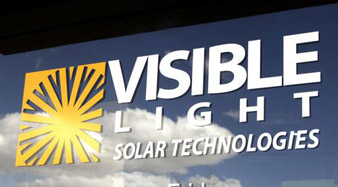Noribachi Launches Low-cost LED Bulbs for Commercial Use

Smart technology inside Noribachi Group’s solar-powered LED lights shuts them on and off as needed.
August 30, 2010 | Premium content from New Mexico Business Weekly, by Kevin Robinson-Avila
The Noribachi Group LLC in Albuquerque is breaking new ground again — this time with a line of light-emitting diode (LED) bulbs for commercial and industrial businesses.
The bulbs could substantially lower the cost of LED installations, because they’re made to fit 95 percent of the traditional, incandescent fixtures on the market. That means businesses no longer have to buy expensive fixtures specially designed for LED, said Noribachi co-CEO Rhonda Dibachi.
“Today, you have to take the whole fixture off and replace it to use LED lighting,” Dibachi said. “With our product, you can keep it all and just put in a new bulb.”
LED bulbs are already common for home lamps and lights. But the much-higher wattage needed for commercial and industrial lighting—ranging from 250 to 1,000 watts—has made drop-in replacements difficult.
Noribachi’s bulbs can be installed by a licensed electrician in about 20 minutes for virtually all incandescent fixtures up to 1,000 watts, Dibachi said. Bulb prices range from $250 to $1,500, while companies now must spend up to $5,000 or more on new fixtures. And the LED bulbs typically provide about 50,000 hours of light capacity, or about seven years at 24 hours a day.
“There’s about a two- to three-year return on investment,” Dibachi said. “It’s not exactly a drop-in solution, since you still need a licensed electrician to install the bulbs, but they can be used to rapidly retrofit the vast majority of fixtures on the market.”
The bulbs are compliant with the federal Energy Star program. They conform to Underwriters Laboratories (UL) standards and are electrical transmission line (ETL) classified in the U.S. and Canada.
Noribachi says the bulbs provide daylight-quality illumination while consuming 85 percent less energy than incandescent lights.
Thanks to such energy savings, the market for LED lighting is growing rapidly. Colorado-based Pike Research estimated in May that LEDs will account for about 46 percent of the $4.4 billion U.S. market for lamps in the commercial, industrial and outdoor fixed lighting sectors by 2020, up from 2 percent now.
Unlike traditional incandescent lights, which push electricity through a filament that heats up and glows to provide light, LEDs use semiconductors to carry positive and negative charges that give off energy in the form of light as they recombine within the semiconductor material.
With incandescents, 95 percent of the energy is converted to heat, meaning only 5 percent of the energy used is converted to light, said Mike Coltrin, a physical chemist and solid-state lighting specialist with Sandia National Laboratories.
Most LEDs on the market today have a 30 percent efficiency rate, but research and development is expected to increase that rate to 50 percent within three to four years, and eventually to 100 percent, Coltrin said.
LEDs are more expensive to produce. But as more products hit the market, such as the Noribachi bulbs, costs come down.
“New products like these make the technology more accessible to consumers,” Coltrin said.
The bulbs will be made and sold through Qnuru (pronounced kuh-new-roo), which comes from the Swahili word for light, combined with the letter Q for quality.
Qnuru is one of five companies established since 2008 by Noribachi, a venture accelerator that creates and adapts new solar and clean energy technologies for everyday consumer products. Qnuru and Visible Light Solar — another Noribachi firm that markets solar-based LED lights — merged into a single company this year.
Qnuru has installed solar LED lights in Old Town in Albuquerque, and it’s testing products at various city locations, including the Albuquerque International Sunport, said John Garcia, the city’s economic development director.
“Noribachi has been moving a lot of new technology into the market, and they’re doing it all right here in Albuquerque,” Garcia said. “It’s a great story for us. We want them to keep developing and growing their business here.”
